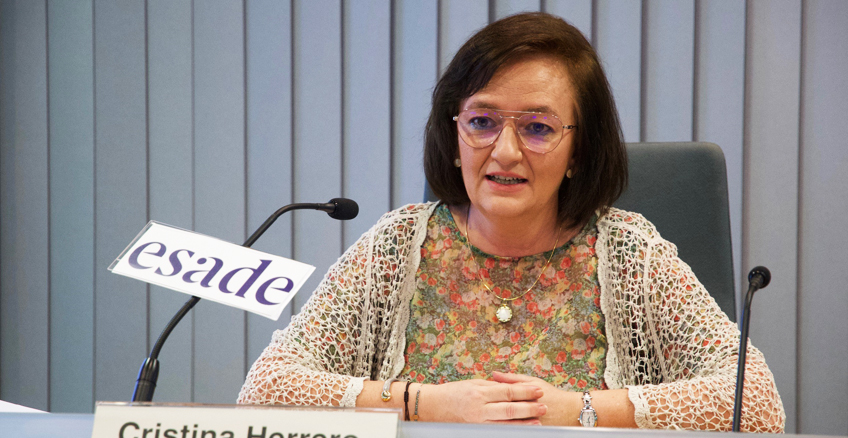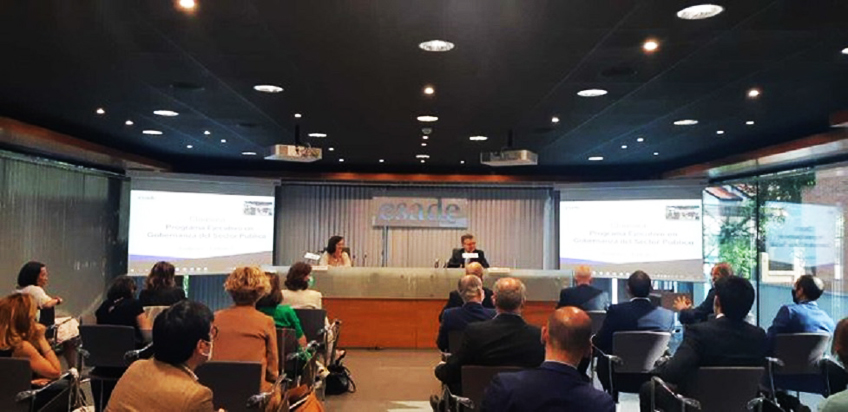AIReF President Cristina Herrero Calls for Greater Institutional Quality and Highmindedness to Face an Unprecedented Situation
The President of the Independent Authority for Fiscal Responsibility (AIReF) participated in the closure of the Executive Program in Public Sector Governance run by the ESADE-PwC Observatory for the Transformation of the Public Sector.
November, 09 2020 | Editorial office
During her speech, delivered on July 6, 2020 at Esade Madrid, Cristina Herrero reviewed the two-year macroeconomic and fiscal analysis exercise conducted by AIReF in the extraordinary and unprecedented current situation, marked by economic and institutional uncertainty.
All the institution’s scenarios feature a contraction of activity in 2020 of unknown magnitude and a recovery which at present is perceived as incomplete. The AIReF scenarios point towards a sharp rise in spending, a drop in revenues, and very high levels of debt and deficit, which adds up to an intense deterioration of the fiscal balance in 2020, with a limited recovery for 2021. This is reflected in debt, which could stand at between 115% and 120% of the GDP in 2020. This will call for strong fiscal consolidation which moreover will have to be maintained on a long-term horizon.
In this context, Cristina Herrero stressed the need to identify existing imbalances, which Spain already accumulated before COVID-19, and to define an exit strategy for the medium and long term, in which governance must play a key role.
In the words of the AIReF president, in order to improve the quality of institutions it is essential to overcome short-termism and acquire a medium-term approach; to build public policies on empirical evidence on the basis of evaluation; and to foster transparency and accountability as principles that must guide all actions.
Specifically, Cristina Herrero stated that, although it is not easy to plan at this time, uncertainty cannot be an excuse for putting off this exercise of medium-term strategy and forecasting. This strategy, according to the AIReF president, must boost activity in the short term, but at the same time lay the foundations for strong, inclusive and sustainable future economic growth. Furthermore, it should involve all levels of public administration to ensure proper coordination and joint responsibility, and it should include a tentative calendar for meeting targets.
Regarding the evaluation of public policies, Cristina Herrero highlighted that, now more than ever, it should accompany public policy design and monitoring in order to make the necessary short-term measures compatible with more medium-term planning. In her opinion, evaluations provide elements of analysis for a calm and well-founded response. AIReF in fact endeavors to spread evaluation culture, to which end it is necessary to guarantee access to quality administrative data.
Finally, she stressed the importance of transparency and accountability as another of the cornerstones of any state that purports to have quality institutions. According to Cristina Herrero, transparency is fundamental for maintaining trust in public institutions, and recovering trust will be part of the exit strategy for offering certainty in both economic and health matters.
More about the Executive Program in Public Sector Governance here.
More about the ESADE-PwC Observatory for the Transformation of the Public Sector here.
























It is mandatory to be registered to comment
Click here to access.
Click here to register and receive our newsletter.